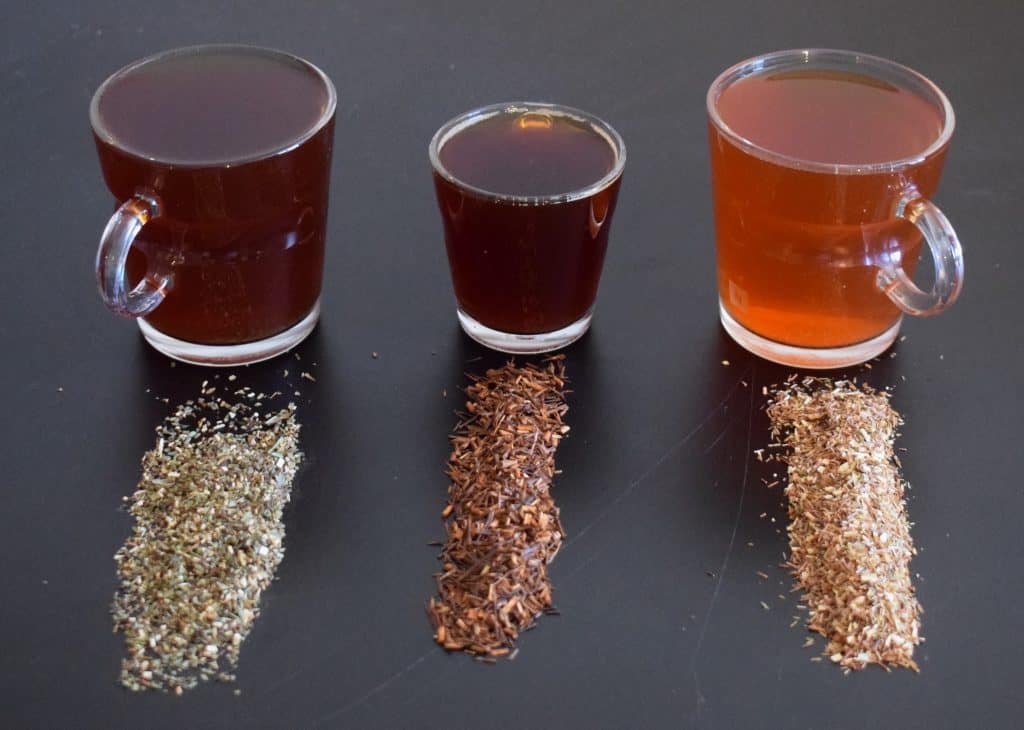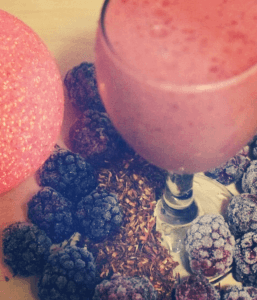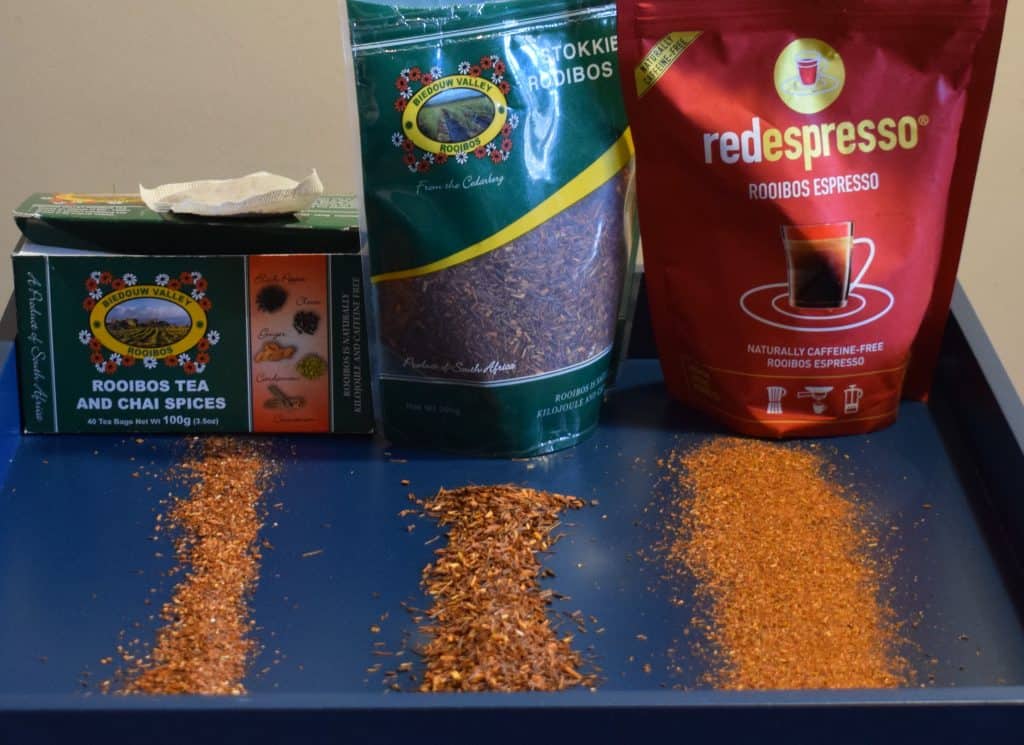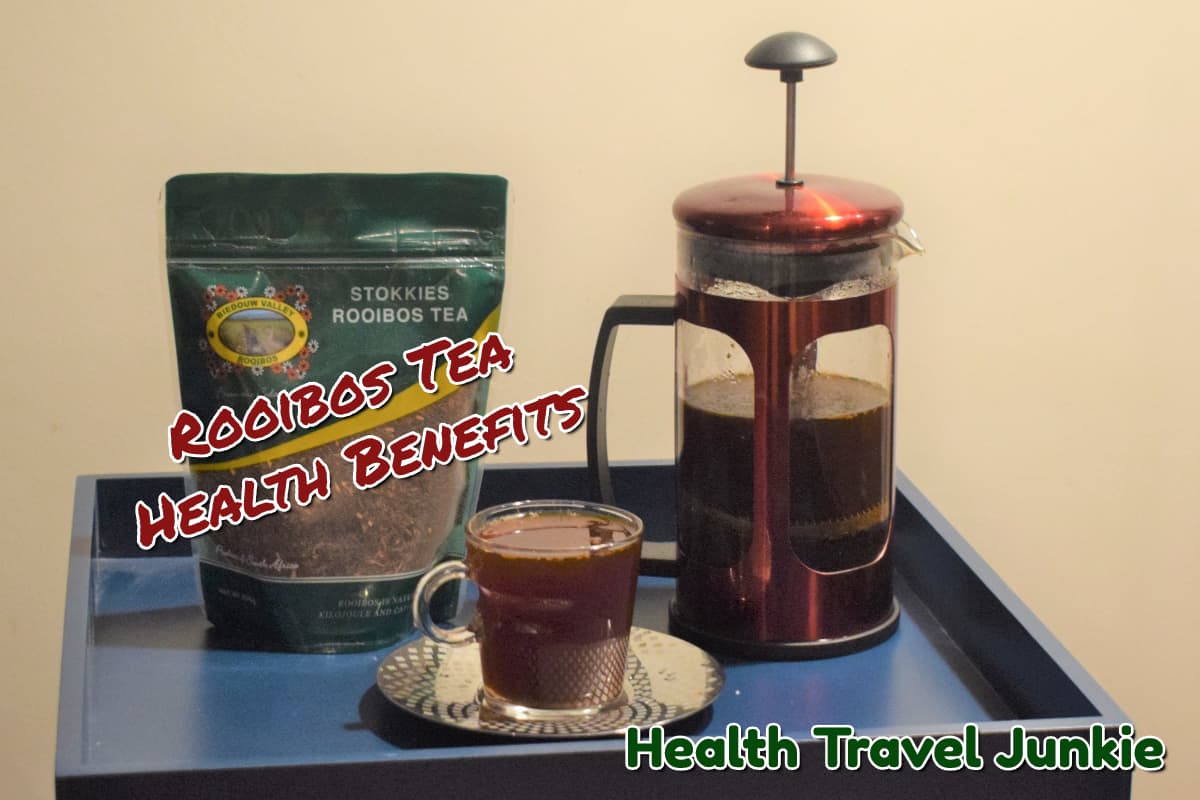Rooibos tea (Afrikaans for “Red Bush”) is the famous deep-red colored antioxidant-rich tea from South Africa. It’s also widely consumed in other countries. This is due to its health benefits and unique pleasant taste.
Contents
- 1 What Exactly Is Rooibos Tea?
- 2 Naturally Caffeine Free
- 3 Rooibos Tea Benefits For Skin
- 4 Low Levels of Tannins
- 5 Rooibos Tea Is Loaded with Antioxidants
- 6 Heart Healthy Tea
- 7 Soothing Mixtures
- 8 Alleviate Asthma
- 9 Maintaining Healthy Body-Weight
- 10 Bone Health
- 11 Further Benefits
- 12 Potential Side Effects
- 13 Conclusion: Rooibos Health Benefits
- 14 Rooibos Blackberry Smoothie
- 15 Buy Rooibos Tea Online
What Exactly Is Rooibos Tea?
Rooibos tea is made from the plant known as Aspalathus linearis. It traditionally grows on the Western coast of South Africa, where it’s been consumed as a beverage for hundreds of years, both by indigenous Bushmen tribes as well as European settlers. However, the first Rooibos tea exporter was a Russian Immigrant to the Cederberg region, Benjamin Ginsberg in 1904. Subsequently, the tea was mainstreamed by a local doctor Dr Annique Theron in 1968, with her book: “Rooibos: An amazing discovery” (Available on Amazon Kindle here).
Rooibos tea is typically prepared as a hot beverage, but often also as a cold iced tea. Others use Rooibos to make espressos and lattes. With regards to non-food uses, it’s sometimes added to shampoo, conditioners, soaps and skin creams.
There are two major forms of Rooibos tea: Traditional and Green. Traditional Rooibos tea is made by fermenting the red bush leaves. On the other hand, Green rooibos is not fermented and tends to have a grassier flavor than regular Rooibos tea. The red color of the tea, and most of the flavor, only emerges after fermentation.
Another tea, like a less popular cousin to the Rooibos plant, is Honeybush. There’s a definite difference in flavor. As the name suggests, Honeybush has more of a honey taste.
Below you can see where exactly in South Africa Rooibos is produced. While the largest export markets are (1) Japan (2) Germany and (3) The Netherlands.

Naturally Caffeine Free
If you ask the average person what they are addicted to, they’ll probably mention caffeine. It’s a natural stimulant that tends to be safe and well tolerated in moderate amounts. Drinking too much caffeine has been linked to health issues such as increased anxiety, headaches and sleep disturbances (1).
The good news about Rooibos tea is that, unlike black or green tea, it’s naturally caffeine free. Thus you’re able to drink it anytime in the day, also at night, without caffeine-related side-effects.
Rooibos Tea Benefits For Skin
There’s no direct skin benefits simply due to drinking rooibos tea. However, a study of cosmetic blends showed that topically applying a mix of Rooibos and regular tea (Camellia Sinensis) improved the appearance of wrinkles by 10% over a period of 28 days (2). Thus, consider placing rooibos tea bags over your eyes to help reduce the appearance of crow’s feet.
In another study, Rooibos tea was applied to mouse skin prior to applying a tumor promoter. Researchers found that Rooibos tea inhibited skin tumor formation in mice. The effect was noted to be even stronger with Green Tea and Honeybush, than with Rooibos tea, due to higher flavonol content in the first two (3).
Low Levels of Tannins
Tannins are natural compounds found in teas. They give black tea its characteristic bitter flavor. Rooibos tea has much lower levels of tannins than green and black teas.
In addition to being bitter, these compounds can interfere with your body’s absorption of certain vitamins and minerals, such as iron (4). If you suffer from iron deficiency, consider only drinking your tea between meals. Or try rooibos tea, so that the tannins do not interfere with your body’s normal absorption of iron.
Many drink tea to settle their nerves or digestive system. However, high levels of tannins, especially on an empty stomach, can cause nausea. As such, drinking Rooibos tea minimizes the possibility of your “cuppa” causing digestive upset.
Nevertheless, tannins do have protective anti-oxidant effects in the body as well. Thus, it’s a matter of weighing the pros and cons.
Rooibos Tea Is Loaded with Antioxidants
You won’t find much tannin-specific antioxidants in Rooibos tea, but it’s still packed with other free-radical scavenging molecules. These antioxidants are Rooibos tea’s greatest health benefit. Antioxidants help protect the cells in your body from damage caused by free radicals, while reducing the risk of developing illnesses like cancer. Otherwise, rooibos tea is not a significant source of vitamins and minerals, except for Copper and Fluoride.
The green rooibos tea tends to have more antioxidants than the fermented traditional rooibos tea. In a study, antioxidant levels in the blood stream were measured after drinking red rooibos and green rooibos (5). The antioxidant increase with unfermented green rooibos was 6.6 percent, as compared to the traditional red rooibos tea’s increase of 2.9 percent. The increase noted in the participants’ blood streams lasted for around 5 hours (while peaking 1 hour post-consumption).

Cancer-fighting Antioxidants
Two of the anti-oxidants discovered in Rooibos tea are Quercetin and Luteolin. These anti-oxidants have not been studied directly in humans, but test tube studies have positively supported quercetin and luteolin’s role in both destroying cancer cells and cancer prevention (6). There are only small quantities of these two anti-oxidants found in a cup of rooibos tea, but every bit helps.
Diabetes
Rooibos tea is also the only natural source of aspalathin, an antioxidant that may prove to be highly beneficial for those with type II diabetes. In animal models, supplementation with aspalathin helped to reduce insulin resistance. It also helped the animals balance their blood sugar levels more effectively (7).
Liver Detox
Anti-oxidants are often associated with liver function, because the liver helps detoxify the body. Moreover, the liver is responsible for metabolizing many medications, alcohol and other potentially harmful substances.
A 2014 study of Rooibos tea’s effects on the liver, uses rats as the test subject. The study’s conclusion is that Rooibos tea improves the liver’s antioxidant capacity, thus increasing your body’s protection against toxins (8).
Heart Healthy Tea
Drinking rooibos supports improvements in the human cardiovascular system. This includes the effect of the antioxidants Aspalathin and Nothofagin. These two compounds have been linked to reducing the risk of both (a) developing inflammation of the blood vessels, as well as (b) atherosclerosis (9). Thus, it may also reduce the risk for heart attacks and stroke.
In addition, a 2010 study (10) found rooibos tea improves cholesterol levels. This study was performed on 40 adults who were overweight and at a high risk for developing heart disease. When they were made to consume six cups of fermented/traditional Rooibos tea per day, their LDL or “bad” cholesterol levels significantly decreased. At the same time, their HDL or “good” cholesterol significantly increased.
Rooibos tea may also have positive impacts on blood pressure in humans. Angiotensin Converting Enzyme (ACE) increases blood pressure through a complicated mechanism of action where the enzyme leads to the contraction of blood vessels. Drinking rooibos tea has been shown to inhibit ACE for about an hour after ingesting a regular cup of tea (11).
Soothing Mixtures
Rooibos tea has long been used for its soothing properties. Those suffering from stomach pain or cramps believe consuming the tea may help settle their digestive system. Moreover, rooibos has even been given to infants to help treat colic. Many find drinking a cup of rooibos tea to be relaxing, and the absence of caffeine means no risk of side-effects like shakiness or anxiety. Others have used rooibos to treat allergies. Ideally, more research will be done to backup these claims which are mostly anecdotal.
Alleviate Asthma
Evidence suggests rooibos has a bronchodilatory effect in the lungs, due to the presence of the flavanoid, Chrysoeriol (12). Thus, rooibos has potential in treating Asthma, by opening the airways and making breathing easier. Being a versatile flavanoid, Chrysoeriol has a few other roles in the body as well, namely antioxidant, anti-inflammatory, anti-tumor, anti-microbial, and anti-viral.
Maintaining Healthy Body-Weight
Drink a cup of tea to help reduce weight? Rooibos tea contains only around 3 calories per cup, unless you add milk or sugar. Plus, tea drinking ups your daily water-intake (which is good for weight-loss as well). Of course, with antioxidants included, rooibos tea is even healthier than water.
Rooibos tea has been shown to help stop the formation of new fat cells (known as adipogenesis). At the same time, rooibos increases metabolism of existing fat molecules (13). This is partly due to the effect of Rooibos consumption on Leptin levels in the body. Leptin is an appetite suppressing hormone that helps maintain a healthy body-weight. It’s worth noting that these benefits are thanks to chronic rooibos consumption. Thus no miracles can be expected from drinking only one or two cups of tea.
Another antioxidant responsible for rooibos’ weigh-loss effect is Aspalathin. This flavanoid helps to reduce the stress hormones which triggers hunger and fat storage. Interesting fact: Aspalathin is the cause of the fermented rooibos tea’s bright red color.
Bone Health
Tea is traditionally associated with higher bone mineral density, due to the presence of polyphenols and their protective antioxidant effects (14). Flavonoids account for 60% of all polyphenols. In particular, Luteolin and Orientin are two Rooibos tea flavonoids showing promise to enhance bone mineral health in vulnerable estrogen-deficient women (15).
Some articles claim Rooibos tea is also a good source of Calcium (which is considered to be one of the building blocks of bone health). But a cup of rooibos provides only 0.1% of the Recommended daily intake of Calcium (thus close to zero).
Further Benefits
- In 1997, Japanese researchers found that daily ingestion of the alkaline extracts of rooibos tea may suppress HIV infection (16).
- In a 2012 study, rooibos improved sperm quality in rats. This is believed to be due to the synergistic effect of all the beneficial compounds in rooibos, and not only due to one specific antioxidant (17).
- In 2008, another study substituted the drinking water of Japanese Quail birds with rooibos tea, and incorporated finely-ground rooibos into their diet. The result was that quail hens produced more eggs later in their lifespan, than previously (18). This could be due to either (a) the antioxidant effects or (b) the phyto-oestrogenic effects of rooibos.
Potential Side Effects
The good news is that there are few, if any, side effects to drinking rooibos tea. The lack of caffeine and the assortment of antioxidants found within this tea increases the likelihood that it will be well tolerated in all drinkers.
The smooth flavor of rooibos tea means that you don’t necessarily have to add anything to the tea to enjoy it. This is unlike black tea, to which many tea drinkers need to add sugar or milk to combat the taste of the tannins.
The biggest potential side effect from rooibos tea is that it may stimulate the production of estrogen, a female sex hormone (19). However, you would need to drink a substantial amount of rooibos to see any effects (which would generally be very mild). However, those with hormone-related conditions, including breast cancer, may want to consult with a doctor before drinking large quantities of the tea.
Conclusion: Rooibos Health Benefits
Prepare a nice large rooibos brew using a coffee press (and not only a small cup). It’ll flood your bloodstream with anti-oxidants, at least for a few hours. This is similar to drinking freshly-pressed green juice for its elixir effect. As the idiom goes: Anima sana in corpore sano. A Healthy Mind is found in a Healthy Body. Because whether you are trying to lose weight or are at risk for cardiovascular disease, rooibos tea can be a delicious part of a healthy diet.
Ideally, more studies will be done to assess the effect of rooibos on conditions such as allergies and digestion. But overall rooibos is an awesome health-boosting drink, and great replacement for beverages like sodas, alcohol, instant coffee, and processed fruit juices.
Rooibos Blackberry Smoothie
To complement the article, we now finish off by including a Rooibos Tea Smoothie recipe. Although you can obviously add whichever fruit you prefer, this is to show that your enjoyment of Rooibos should not only be limited to the conventional way of consuming the tea. Let’s start with ingredients, then we follow up with instructions:
Ingredients
- Blackberries (Frozen or Fresh)
- Banana
- Almond milk (or any other plant milk)
- Honey, Agave, Dates or any other natural sweetener
- Rooibos tea

Instructions
- Make the Rooibos tea. The stronger the better. My method is to steep the tea in a French coffee press. Add the rooibos herb to the Coffee press. Then add boiling filtered or mineral water. Let it steep for a while, until you notice a nice deep red color in the tea.
- Add a natural sweetener of choice to your Rooibos tea.
- Add ice to your blender. This step is essential to cool down the hot tea. Unless you first put the rooibos in a refrigerator.
- Add the Rooibos tea to the blender. Now you have ice tea.
- Next, add the other ingredients, namely banana (2 small ones or 1 large one), the plant-based milk (add more for a thinner consistency, less for thicker smoothie), and the blackberries in a good ratio to the bananas.
- If you want to sweeten it more, simply adjust the taste by blending in dates to your smoothie.
- Blend the smoothie
- Enjoy
Buy Rooibos Tea Online
You could find rooibos tea bags at your local organic health shop (depending on in which country you live). Otherwise, I recommend I-Herb – a popular online store with worldwide delivery. Their number one selling Rooibos tea product is the Rooibos-Chai teabags (Click here to find out the up-to-date price at IHerb).
If you want to prepare your Rooibos tea like I do with the Coffee Press, check out the 1lb bag of Loose Leaf Rooibos tea over at Iherb by clicking here.
What’s your view on Rooibos tea health benefits. Would you recommend Rooibos or do you prefer another type of tea? Post your tips, comments and questions below for other tea drinkers!



